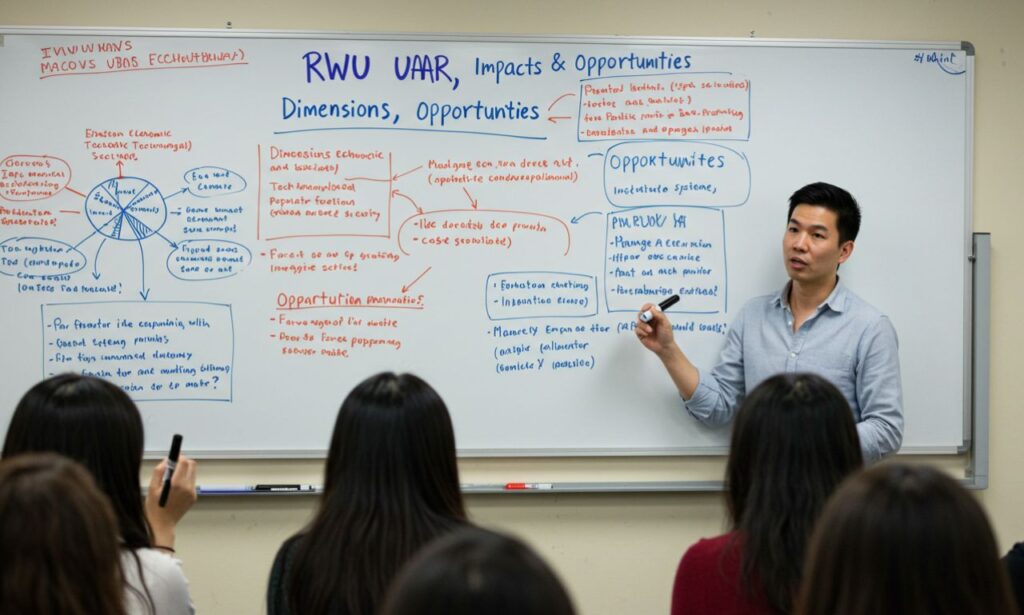The acronym RWU UAR rings with possibility, mystery, and a promise of interdisciplinary bridging. Whether you’re a student, researcher, or a curious mind, understanding “RWU UAR” can open doors to how research, higher education, and technical systems interact today. In this article, I aim to offer a 100% unique, human-centered exploration of RWU UAR—its meanings, applications, challenges, and future directions. We’ll walk through real contexts, compare uses, and zero in on how this concept matters for you.
What Does RWU UAR Mean?
To begin, RWU UAR is not a fixed term with a single meaning. Rather, it is a versatile acronym whose interpretation depends on context. Some of its common expansions include:
-
RWU = Roger Williams University (in the U.S.), UAR = Undergraduate Academic Research
-
RWU = Reutlingen University of Applied Sciences (Germany), with UAR = University Applied Research
-
In technical or IT systems, RWU may mean Read/Write Unit, and UAR as User Access Request
-
In local contexts (e.g. Pakistan), RWU could refer to Rawalpindi Women University, with possible uses of UAR in its internal research programs
Because of its multiple potential expansions, part of the journey is understanding the context in which “RWU UAR” appears.
RWU UAR in the U.S. Academic Context: Roger Williams University
Who is RWU?
Roger Williams University (RWU), located in Rhode Island, is a well-known institution offering undergraduate, graduate, and professional degrees. It emphasizes experiential learning, combining academic rigor with real world exposure and community engagement.
What is UAR at RWU?
At RWU, UAR often refers to Undergraduate Academic Research—a program or framework that allows undergraduate students to take part in meaningful research work under faculty mentorship. In such setups, students don’t just absorb content; they contribute to knowledge creation.
Why RWU UAR matters for students
Engaging in undergraduate research offers deep benefits:
-
You sharpen critical thinking, statistical skills, writing, data interpretation
-
You build confidence by presenting at symposia or publishing
-
You strengthen your résumé or graduate school applications
-
You form mentor relationships and professional networks
At RWU, the UAR program helps bridge classroom theory and hands-on project work.
How involvement works
Typically, a student interested in RWU UAR would:
-
Identify a faculty mentor or research group aligned with their interests
-
Co-design a research question or project
-
Collect data, run experiments, conduct surveys or archival work
-
Analyze results under guidance
-
Present findings (on campus, at conferences) or publish
This journey is not rigid—it may be adapted to humanities, social sciences, STEM, or arts.
RWU UAR in the German / European Setting: Applied Research Focus
RWU as Reutlingen University of Applied Sciences
In Europe, RWU is sometimes used to refer to Reutlingen University of Applied Sciences (Fachhochschule). This institution places strong emphasis on applied, practice-oriented education—blending theory with industry relevance. (Some recent articles refer to this usage when discussing “RWU UAR”)
UAR in Germany: University Applied Research
Here, UAR (University Applied Research) captures the notion of universities conducting research with direct industry or societal application—rather than purely theoretical work. The concept centers on solving real problems, fostering innovation, and creating products or solutions that extend beyond academic circles.
How RWU UAR operates in this setting
In this model:
-
Students and faculty partner with local companies, municipalities, NGOs on real projects
-
Research outcomes may include prototypes, implementations, or business pilots
-
Intellectual property, commercialization, or start-up spinouts may emerge
-
The university acts as a bridge between academic insight and industrial need
This variant of “RWU UAR” emphasizes that research should not just remain in journals—it should act.
RWU UAR in Technical / IT Contexts
Outside academia, “RWU UAR” sometimes arises in system logs, platform documentation, or automation tools. In such settings:
-
RWU can stand for Read/Write Unit — a module of system architecture handling read and write operations
-
UAR might denote User Access Request — the mechanism by which users request access to resources or privileges
When combined, can refer to processes where a user’s request is mediated via the system’s read/write module. This is more niche, but relevant in backend systems, security logs, or audit trails.
RWU UAR in Pakistan: Rawalpindi Women University
In Pakistan, RWU often refers to Rawalpindi Women University, which is a public university established in Rawalpindi and operating jurisdiction under Punjab’s government. The university offers multiple undergraduate (BS), master’s, and MPhil programs.
In this local setting, a term like UAR may be adopted internally to denote Undergraduate Academic Research or departmental research schemes. For instance, the university has an Office of Research, Innovation & Commercialization (ORIC) to promote applied research and innovation per Higher Education Commission guidelines.
So, in Pakistan would likely point to Rawalpindi Women University’s undergraduate research initiatives under its ORIC or departmental networks.
Comparing the Variants: What Unites RWU UAR Across Contexts
Though the meanings differ depending on region or discipline, the common threads include:
-
Research focus — whether undergraduate, applied, or technological
-
Bridging theory and practice — linking ideas to real problems
-
Collaboration — between students, faculty, industry, or systems
-
Empowerment — giving more agency to undergraduates or system users
-
Impact orientation — pushing for work that matters, publishes, or innovates
In every case, is less about the acronym and more about a philosophy: research that engages, produces, and transforms.
How Students & Practitioners Can Engage with RWU UAR
Whether you are studying at RWU (Roger Williams, Rawalpindi, Reutlingen) or interacting with a system involving , here’s how you can engage meaningfully:
-
Seek out faculty doing projects aligned with your interest
-
Pitch your own ideas—even small ones—in departmental forums
-
Volunteer in labs or centers to gain exposure
-
Attend workshops on research design, ethics, methodology
-
Try to publish, present, or share your work beyond class
-
Create formal UAR frameworks or offices like ORIC
-
Ensure funding, infrastructure, mentoring support
-
Foster interdepartmental and industry collaboration
-
Provide platforms to exhibit student research
-
Maintain rigorous but enabling policies
-
In systems where appears, forward logs or system messages to administrators if needed
-
Understand how read/write units and access requests interact for security andperformance
Key Benefits & Challenges of RWU UAR
Benefits
-
Skill building: Students gain analytical, writing, presentation, and project management skills
-
Differentiation: Research experience helps in applications for jobs or grad school
-
Innovation linkage: Institutions become nodes of creativity tied to society
-
Community relevance: Local problems can be addressed via student research
-
Cross-disciplinary insight: Collaboration encourages perspective blending
Challenges
-
Resource limiting: Infrastructure, funding, and mentoring are often strained
-
Equity gap: Students from less privileged backgrounds may have less access to opportunities
-
Unclear incentives: Faculty may not always be rewarded for mentoring undergraduate research
-
Quality vs quantity pressure: Scaling programs may risk superficial projects
-
Sustainability: How to keep research pipelines flowing, avoid burnout
Future Directions & Trends for RWU UAR
Looking ahead, (in all its variants) is evolving in these directions:
-
Digital collaborative platforms: Virtual labs, shared databases, AI tools to support research
-
Global partnerships: Cross-institution projects, student exchanges, co-mentoring
-
Commercial spinouts: Research projects becoming startups, technology licensing
-
Embedded curriculum: Making research an integral component of many courses, not optional
-
Better access & inclusivity: Ensuring broad participation, supporting marginalized students
-
Stronger evaluation and impact metrics: Assessing not just output but social and economic impact
In short,is likely to become a more integrated, tech-driven, inclusive, and outcome-oriented system over time.
Real-Life Example: A Student Journey under RWU UAR
Let me share a plausible narrative:
A student enrolled at RWU (Roger Williams) majoring in environmental science has a passion for water quality issues. In her sophomore year, she attends a UAR orientation event. She approaches a faculty member studying local river health. Together they design a project to test microplastic contamination in city streams.
She collects water samples, analyzes in the lab, compares with benchmarks, and uses statistical models to interpret results. She writes a paper, co-authors with her professor, then presents at a regional undergraduate research conference.
Because the work has relevance to local environmental agencies, she also discusses with the city’s water department. In her junior year, she receives a small grant to extend her study. Eventually, her findings contribute to policy recommendations.
That student gains research experience, networks, real impact, and a compelling graduate application while helping her community.
Best Practices for a Healthy RWU UAR Ecosystem
To ensure that remains meaningful and sustainable, here are some guidelines:
-
Mentorship matters: Dedicated faculty mentors plus peer mentors
-
Clear pathways: Structured application, project selection, timelines
-
Seed funding: Small grants or fellowships for students
-
Publication & presentation support: Workshops, funds, institutional backing
-
Ethics & oversight: Institutional Review Boards, research integrity
-
Visibility & celebration: Showcase student work via airs, websites, media
Summary & Takeaways
-
RWU UAR is a multi-faceted concept with variations across regions and domains
-
It frequently pairs RWU (a name of a university) with UAR (a research program) but in tech contexts can mean system processes
-
In academic settings, it seeks to empower undergraduate or applied research, blending theory and real work
-
offers strong benefits, but challenges like resources, equity, and scaling remain
-
Its future lies in digital tools, deeper integration, inclusivity, and impact focus
If you are a student, educator, or professional encountering , I encourage you to lean into it—ask questions, propose research, collaborate. The acronym is more than letters: it’s an invitation to co-create knowledge.
Frequently Asked Questions (FAQs)
What exactly is RWU UAR?
refers to different but related concepts—commonly “Roger Williams University Undergraduate Academic Research,” “Reutlingen University Applied Research,” or in technical contexts system units for access operations.
Can be applied in any discipline?
Yes. Whether in sciences, humanities, arts, business, or engineering, research is possible. The key is framing meaningful questions suitable to resources and mentor guidance.
How do students joi projects?
Often by reaching out to faculty, browsing university calls for proposals, attending research fairs, or submitting project ideas for advisorial review.
Does guarantee publication or funding?
No guarantee—but good programs support students with mentorship, small seed grants, and pathways to present or publish. Success depends on project quality, guidance, and persistence.
How do differ from regular class assignments?
Regular assignments often have known outcomes; is investigatory. You define goals, manage unknowns, adapt, and contribute new knowledge rather than merely respond to prompts.
Is only in universities?
Mostly yes—but in tech or enterprise settings, analogues exist (e.g. access request systems). The core idea of coupling inquiry with function can apply broadly.







